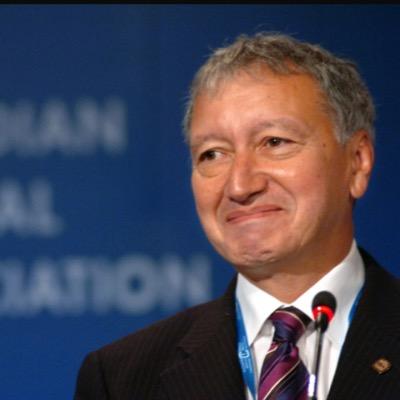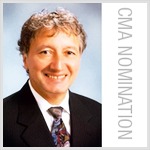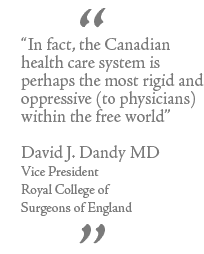
Dr. Brian Day
@DrBrianDay 
- Past President Canadian Medical Association
- Past President Arthroscopy Association of North America
- Honourary Associate Professor University of British Columbia
- 2014 Doctors of BC Don Rix Leadership Award


"Personally, I do not see in Canada it would be a feasible thing if any Ministry organized taking over both the Health and the Disease of the entire community… even in the most favourable circumstances ….there would be that absence of competition and that sense of independence…I do not believe it would be good for the profession or good for the Public."
Sir William Osler in a speech to the Medical Society of the Canadian Army Medical Corps (1918)
"…our noble tradition that no sick person of any age, sex, race or religion whatsoever, shall ever suffer for need of medical care on account of poverty or any other cause…should be based on our willingness to give, and should be construed as an act of our charity. It should not be exploited: nor should it be assumed as a God-given right by way of its beneficiaries. Least of all should it be a right-of-way for needy and penurious governmental and administrative bodies."
- Dr. J.H MacDermot Osler lecture (1939)
My decision to stand for President-Elect of the Canadian Medical Association is based on the need for change. We must reassert our role as independent professionals. The Supreme Court of Canada in the Chaoulli case emphasized it was their duty to rise above political debate and ideology. We must do likewise. We and our patients have suffered at the hand of governments. For 20 years they have tried to fix the system and have failed. Now it is our turn. We must embrace the principles of Osler and MacDermot and regain our national leadership role in health care. We must empower patients as consumers. The exclusion of market forces has allowed increased demands for services to coincide with decreased practice revenue for physicians. We have witnessed divisions within our ranks and the profession’s unity is under threat. No matter how well our provincial organizations negotiate, governments lack the resources needed to rectify the income loss and other disparities that have resulted from rationing.
The public perception of the trustworthiness and integrity of various professions ranks ours near the top and politicians at the bottom. There is no need to succumb to their bullying. As Premier of Saskatchewan, Roy Romanow’s government created the worst waiting lists in history. Why did many of our leaders embrace his Commission’s recommendations after it dismissed waiting list problems, rejected meaningful reform, and blamed the failure of Medicare on physicians? Why is our official CMA journal so often the voice of anti-physician propaganda, publishing op-ed articles that attack our integrity? Governments closed medical and nursing schools and created a manpower shortage that left millions of Canadians without a family doctor. It is time to take back control and recognize that the path to restoring funding for physician services is not through going “cap in hand” to governments. We must also look for additional resources from non government sources.
The introduction of market forces, competition, consumer empowerment and responsibility will lead to improved accountability and performance.
Global funding and rationing are features of our current health system and are barriers to efficiency, productivity and excellence. Through conscription we have allowed governments to offload on us some of the costs of health care inflation. From 1987 to 2005, the percentage of total health expenditures spent on physicians has declined from 15.7% to 12.8%. In my field of orthopaedics, the fee for arthroscopic meniscectomy 25 years ago was $294, while today it is $236 (a 1981 dollar was worth $2.11 in 2004). During that period, the cost of a Vancouver house rose 400%. Similar examples exist in all disciplines. As a result, young practitioners lag behind the older generation in their ability to pay off debts or purchase a home. The $28 in gross office revenue received by a family doctor for a visit is insultingly low. I asked a businessman to calculate the appropriate revenue for such a visit, based on average volume, overhead expenses and expected income for an independent professional. He suggested a figure between $65 and $75 per visit. No government will ever voluntarily increase funding to such levels.
In support of my candidacy for President Elect of the CMA, I offer the following:
Tom Sackville, a British Minister of Health under Maggie Thatcher, told delegates at the recent CIMCA Health Summit in Vancouver of the fear and respect the “Iron Lady” had when it came to confrontation with doctors. “She would order the British Navy (with Prince Andrew) to the South Atlantic and engage Argentina in war, but drew the line at waging battle against the British Medical Association” he said. The CMA must take the lead in enforcing patient and doctor rights. We must reject the divide and rule strategy that has been used by government to weaken us. “Access to a wait list is not access to care” stated the Supreme Court. “Canadians are suffering and dying on wait lists”, they wrote. It is our duty to eliminate rationing of resources. I stand for change and major reform. I hope to receive your support.

Dr. Brian Day